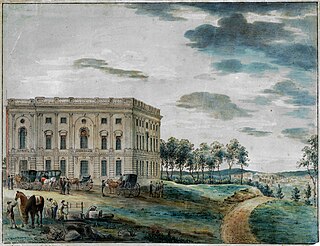
The 8th United States Congress was a meeting of the legislative branch of the United States federal government, consisting of the United States Senate and the United States House of Representatives. It met in Washington, D.C. from March 4, 1803, to March 4, 1805, during the last two years of Thomas Jefferson's first term in office. The apportionment of seats in the House of Representatives was based on the 1800 United States census. Both chambers had a Democratic-Republican majority.

The 9th United States Congress was a meeting of the legislative branch of the United States federal government, consisting of the United States Senate and the United States House of Representatives. It met in Washington, D.C., from March 4, 1805, to March 4, 1807, during the fifth and sixth years of Thomas Jefferson's presidency. The apportionment of seats in the House of Representatives was based on the 1800 United States census. Both chambers had a Democratic-Republican majority.

Jonathan Trumbull Jr. was an American politician and military officer who served as the governor of Connecticut, speaker of the United States House of Representatives, and lieutenant governor of Connecticut. He is often confused with his younger brother, John Trumbull, a famous artist during the revolutionary war and early years of the United States.
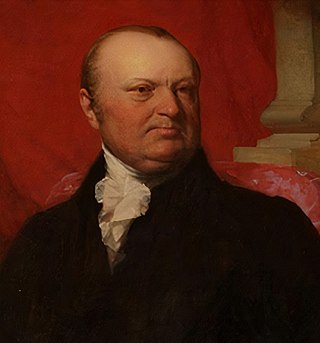
John Taylor Gilman was a farmer, shipbuilder and statesman from Exeter, New Hampshire. He represented New Hampshire in the Continental Congress in 1782–1783 and was the fifth governor of New Hampshire for 14 years, from 1794 to 1805, and from 1813 to 1816.

Calvin Willey was an American politician from Connecticut who served in the United States Senate from 1825 to 1831.
Jonathan Sturges was an American lawyer, jurist and politician from Fairfield, Connecticut. He represented Connecticut as a delegate to the Continental Congress and in the United States House of Representatives.

The 1806–07 United States House of Representatives elections were held on various dates in various states between April 29, 1806 and August 4, 1807. Each state set its own date for its elections to the House of Representatives before the first session of the 10th United States Congress convened on October 26, 1807. They occurred during Thomas Jefferson's second term. Elections were held for all 142 seats, representing 17 states.
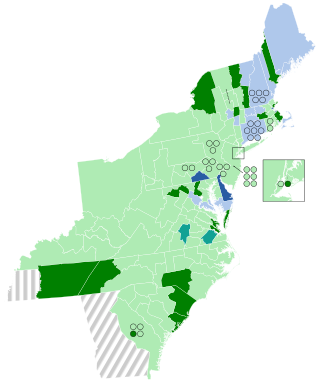
The 1804–05 United States House of Representatives elections were held on various dates in various states between April 24, 1804 and August 5, 1805. Each state set its own date for its elections to the House of Representatives before the first session of the 9th United States Congress convened on December 2, 1805. The elections occurred at the same time as President Thomas Jefferson's re-election. Elections were held for all 142 seats, representing 17 states.
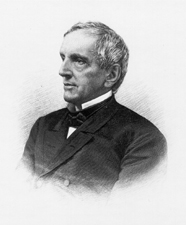
Julius Rockwell was a United States politician from Massachusetts, and the father of Francis Williams Rockwell.
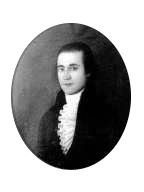
Barnabas Bidwell was an author, teacher and politician of the late 18th and early 19th centuries, active in Massachusetts and Upper Canada. Educated at Yale, he practised law in western Massachusetts and served as treasurer of Berkshire County. He served in the state legislature as representative and senator, as well as in the United States Congress as spokesman for the administration of Thomas Jefferson. He was effective in defending the administration's positions and passing important legislation. He resigned his seat in Congress in July 1807.
Joseph Barker was an American Congregationalist minister who represented Massachusetts's 7th congressional district in the United States House of Representatives from March 1805 to March 1809.

Elections to the United States House of Representatives were held in North Carolina on August 10, 1804 for the 9th Congress.

A special election was held in Delaware's at-large congressional district on October 1, 1805 to fill a vacancy resulting from the resignation of James A. Bayard, a Federalist, upon election to the Senate. Bayard had earlier served in the House in the 5th, 6th, and 7th Congresses before being narrowly defeated for re-election in 1802 by Caesar A. Rodney, whom he, in turn, defeated in 1804.

The Delaware United States House election for 1804 was held October 13–20, 1804. The incumbent Representative Caesar Augustus Rodney was defeated by the former Representative James A. Bayard Sr., whom he had defeated in the previous election, with 52.12% of the vote.

The 1805 Connecticut gubernatorial election took place on April 11, 1805. Incumbent Federalist Governor Jonathan Trumbull Jr. won re-election to an eighth full term, defeating Democratic-Republican candidate William Hart in a re-match of the previous year's election.
This page is based on this
Wikipedia article Text is available under the
CC BY-SA 4.0 license; additional terms may apply.
Images, videos and audio are available under their respective licenses.











